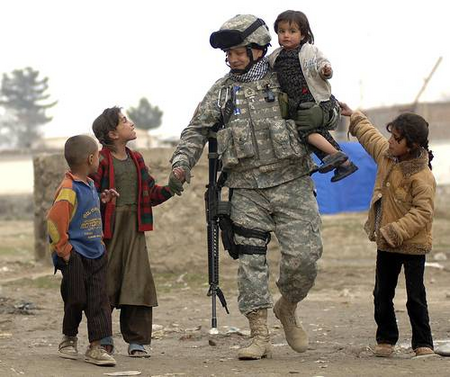
Katherine Tiedemann is a program associate at the New America Foundation/American Strategy Program.
I have to push back on Ben Katcher‘s previous post on several points.
First of all, there are indeed preliminary estimates of how much continued operations in Afghanistan will cost: COIN expert David Kilcullen, certainly not part of the same camp as Boot and the Kagans, pegged the figure for 30,000 extra troops at an extra $2 billion per month on top of the $20 billion we already spend there. Considering President Obama okayed sending only 17,000 additional troops to Afghanistan, the cost will be less than Kilcullen’s estimate. No small change, to be sure, but considering estimates of the cost of the Iraq war range from some $650 billion up to $3 trillion (or $3,000 billion, as my colleague Doug Rediker would say), the Afghan war is still considerably smaller in scale than its behemoth Iraqi counterpart, and therefore commitment in Afghanistan is not necessarily mutually exclusive with addressing the United States’ other national security concerns.
Beyond that detail, the dangers of leaving Afghanistan altogether are great. With Pakistan pushing militants across the border into Afghanistan, security conditions in Afghanistan declining dramatically, and predictions for rising violence in 2009, it is naive to think simply because there are competing priorities on the world’s stage that the United States can turn its attention and resources from this strategically critical region.
President Obama has seemingly embraced the Af-Pak struggle as “his” war, much like the Iraq War was President Bush’s main foreign policy focus. Now is no time to turn our heads from the conflict, just as the United States appears poised to devote the resources to the country that the Bush administration should have.
And so while it is important, as Ben says, to insist on cost estimates and a strategic rationale, we cannot risk allowing the Taliban and al Qaeda safe haven to return to Afghanistan and Pakistan’s wild border regions.
Focusing on economic development and reconstruction aid also must not be left by the wayside any longer. In addition to working with Afghan security forces to bolster stability in the country, the United States should press for security-led reconstruction in Afghanistan; for example, securing the Kabul to Kandahar road and completing construction on the Kajaki Dam in the south (as Peter Bergen described in testimony earlier this month.)
It would be a shame to pull out now, just when the war torn, battered country is at long last getting some more of the resources it so desperately needs.
— Katherine Tiedemann


15 comments on “Guest Post by Katherine Tiedemann: A Quick Case for Maintaining a Presence in Afghanistan”